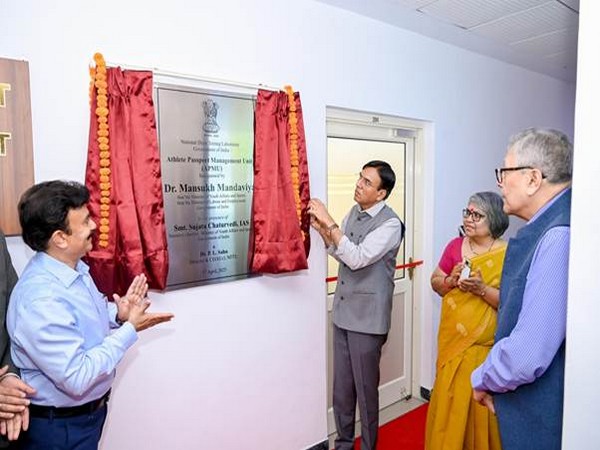New Delhi [India], April 17 (ANI): Union Minister of Youth Affairs and Sports and Labour and Employment, Mansukh Mandaviya, inaugurated the Athlete Passport Management Unit (APMU) at the National Dope Testing Laboratory (NDTL) in New Delhi on Thursday.
This initiative reaffirms India’s commitment to promoting clean and transparent sports practices on both national and international platforms.
Speaking during the occasion, Mandaviya said, “APMU is a key milestone in India’s fight against doping, enabling the longitudinal tracking of Athletes’ Biological profiles through the Athlete Biological Passport (ABP) system. This innovative mechanism will help in detecting doping patterns and protect the fairness of sports by identifying unethical practices”
Calling the APMU a beacon of support for the Global South, the Union Minister stated that it will help our neighbouring countries, which lack sufficient resources, to establish similar systems. “By sharing knowledge and tools, India can support these nations in keeping their sports free from unfair practices. Such initiatives underline the spirit of solidarity and contribute to strengthening sports integrity across the Global South”, he added.
Mandaviya emphasised the potential of regional collaboration, highlighting India’s readiness to extend support to neighbouring countries by sharing expertise and resources through the APMU.
He stated that there is a need for greater involvement of Sports Federations, Organisations, Universities, and Institutes of early education in combating doping and launching awareness campaigns in rural areas.
Furthermore, he mentioned that scientists working in laboratories may educate students from various schools and universities about anti-doping science to raise awareness about doping.
Notably, this is the 17th Athlete Passport Management Unit in the world, which is established in India. It will serve as a specialised body responsible for monitoring and managing the biological passports of athletes.
As India continues to excel on the international sports stage, the Athlete Passport Management Unit highlights the nation’s strong commitment to maintaining fair play and integrity in sports, and also sets a benchmark for ethical sports practices worldwide.
The event was attended by Sujata Chaturvedi, Secretary (Sports), Kunal, Joint Secretary (Sports), other officers of the Ministry of Youth Affairs and Sports, including Eminent Scientists and PL Sahu, Director and CEO(I/c), NDTL.
The concept of the “athlete biological passport” emerged when scientists identified monitoring blood markers as a way to detect doping. With input from stakeholders and medical experts, the World Anti-Doping Agency (WADA) refined and standardised this idea, leading to the Athlete Biological Passport (ABP).
A biological passport is an electronic document that compiles data on an athlete’s biological markers over time. By tracking variables such as blood parameters, hormonal levels, and other physiological markers, the APMU can detect any anomalies or trends indicative of doping without directly identifying banned substances. (ANI)
Disclaimer: This story is auto-generated from a syndicated feed of ANI; only the image & headline may have been reworked by News Services Division of World News Network Inc Ltd and Palghar News and Pune News and World News
HINDI, MARATHI, GUJARATI, TAMIL, TELUGU, BENGALI, KANNADA, ORIYA, PUNJABI, URDU, MALAYALAM
For more details and packages















